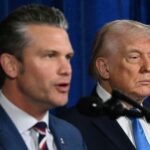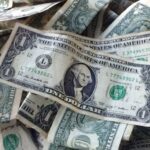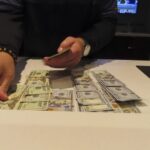
Authored by MN Gordon via EconomicPrism.com,
“Some airlines, if you want six more inches between you and the seat in front, you pay more money but you don’t know it … these are junk fees, they’re unfair and they hit marginalized Americans the hardest, especially … people of color.”
– President Joe Biden, October 26, 2022
Fist Bump Agreements
President Joe Biden just crapped the bed. Again!
The near octogenarian thought he’d struck a secret deal back in July.
You may have seen Biden’s fist bump with Saudi Crown Prince Mohammed bin Salman at the time. The non-binding agreement called for increased oil production until at least December, after the midterm elections.
With additional Saudi Arabian oil, in combination with draining the Strategic Petroleum Reserve, now down 32 percent year-to-date, Biden planned to deliver cheap gasoline to American voters.
His calculation was that this gift would prevent a likely midterm catastrophe for the Democrat party. What a slick political move, right?
Alas, Biden recently woke up – like a pig – rolling around in a mess of his making.
On October 5, the OPEC+ cartel announced it would cut oil production by two million barrels per day starting in November. Then, this week, Saudi Arabia’s energy chief Prince Abdulaziz bin Salman provided the following warning:
“It is my profound duty to make clear to the world that losing (releasing) emergency stocks may be painful in the months to come.”
In this regard, American taxpayers – including you – will have to pay higher oil prices to fill both the Strategic Petroleum Reserve and their own gas tanks in the months ahead. How’s that for presidential strategery?
Biden, no doubt, isn’t the first or the last president that will be overwhelmed by inflation. Jimmy Carter was rolled by it. George H.W. Bush went to his grave blaming Alan Greenspan’s inflation fighting rate hikes for making him a single term president.
Biden, as fortune would have it, now has his ‘turn in the barrel’. What follows is a brief review of how he got there.
Printing Press Financed Lockdowns
During the 2020-21 coronavirus panic-money printing binge only fringe economists and hard money advocates warned there would be hell to pay. The academics, elitists, and central planners pointed to the supposed successes of the money printing that was initiated during the 2008-09 great financial crisis.
‘Ben Bernanke,’ said the government economists, ‘proved that we could have our cake and eat it too.’
Yet they failed to discern an important difference. Bernanke’s quantitative easing (QE) was merely a banking and mortgage market bailout. Fed Chair Powell’s QE, to finance Congresses mega spending bills, included QE for the people. This represented direct injections of printing press money into the consumer economy.
At the same time, shutting down the economy and disrupting supply chains resulted in a massive supply shock. In short, the printing press stimulated demand while lockdowns decreased supply. What did the central planner’s think would happen?
But wait, there’s more…
The feebleminded intellectuals actually expected that, precisely when they commanded it, the economy could be turned back on. With just the flick of a light switch the central planners thought everything would return to normal. What fools!
They failed to recognize several critical factors. Namely, that while the economy was shut down, it didn’t stop entirely. Rather, it continued to evolve and change in ways that were beyond their wildest imagination.
For example, geopolitics didn’t stop during the coronavirus panic. Instead, the vast flaws of globalization were exposed like the Consular Roman Army at the hands of Hannibal in the Battle of Cannae in 216 BC.
Deglobalization
Depending on tenuous trading partners for everything from computer chips to baby formula to prescription drugs to oil was revealed to be a strategic disaster. Of course, everyone could see this all along. But corporate executives were blinded by profits while consumers were blinded by the abundance of cheap gewgaws.
Right now, the 50-year trend in globalization is reversing. One of the consequences of deglobalization will be higher prices for decades to come. Gewgaws will no longer be cheap. Corporate profit margins will diminish.
This is one of many reasons why a handful of rate hikes won’t contain raging consumer price inflation. This is a structural shift that will take several decades to reconcile.
You see, the terrible effect that the radical increase in the supply of money has on the value of money was not recognized by the control freak statists until it was too late. Clever fellows like Paul Krugman and Ben Bernanke encouraged it.
Then when the first whiffs of inflation wafted the foul odor of rotting tomatoes across the land Fed Chair Powell and Treasury Secretary Janet Yellen claimed it was transitory. “If you just hold your breath for a little longer,’ they said, ‘it will soon pass.’
What a crock!
When the stink remained, President Biden tried to blame greedy capitalists and big oil companies. Yet it was his executive orders that revoked the permit for the Keystone XL pipeline and suspended the sale of oil and gas leases on federal lands, which greatly contributed to this mess.
As justification, Biden pulled the “environmental justice” card and said he was “protecting public health and the environment and restoring science to tackle the climate crisis.”
The Sordid Politics of Inflation
Indeed, the consequences of rising consumer prices must be quite extreme before central bankers and big government statists will admit the currency devaluation is a result of their own failed policies. Still, they dismiss any deficiencies on their part.
Then, once recognized, the central bank must mitigate the inflation. From a monetary policy standpoint, the standard strategy is to hike interest rates. But this puts a pinch on government finances and is disparaged by Congress and the president.
Fundamentally, the decline in the value of money is unpleasant and has many disagreeable consequences. Paying more for the same value of goods and services is only the beginning.
Money debasement also brings with it the debasement of all aspects of life. Wage earners, savers, and retirees suffer the loss of purchasing power. Their standard of living also suffers.
Then, as interest rates rise, and asset prices – including stocks, bonds, and real estate fall – their hopes and dreams turn to dust.
In a moral sense, all meaning of right and fairness gradually fades to black…and then to red. People become aware they’ve been cheated by the state. They become irate that they’ve been screwed over by government inflation.
At the same time, business owners and corporate executives are hit with windfall profit taxes, often to alleviate the misery the state has created through money debasement. This jacks up prices even more.
A savvy politician, like Biden, will move from deflecting blame to dividing the population. He’ll go on television and talk about how rising prices ‘hurt people of color.’
Of course, Biden – or any other politician – doesn’t give a rip about you or anyone struggling with rising consumer prices. He just cares about holding onto and enhancing his grasp on power. And government created inflation via the printing press has enhanced the control of big government more than any other mechanism at a politician’s disposal.
These are the sordid politics of inflation that were conspicuously missing from your high school civics class.
Lastly, the big Powell pivot that’s now being telegraphed for the December, Federal Open Market Committee (FOMC) meeting has nothing to do with the arrival of a much-anticipated deceleration in the rate of inflation.
Nope, it’s all politics to juice the stock market in the runup to election day.
* * *
This is a rough market for both savers and investors. Quite frankly, conventional investment strategies won’t cut it. If you’d like to learn more about several unconventional investing ideas for protecting your wealth and financial privacy, take a look at the Financial First Aid Kit.
Authored by MN Gordon via EconomicPrism.com,
“Some airlines, if you want six more inches between you and the seat in front, you pay more money but you don’t know it … these are junk fees, they’re unfair and they hit marginalized Americans the hardest, especially … people of color.”
– President Joe Biden, October 26, 2022
Fist Bump Agreements
President Joe Biden just crapped the bed. Again!
The near octogenarian thought he’d struck a secret deal back in July.
You may have seen Biden’s fist bump with Saudi Crown Prince Mohammed bin Salman at the time. The non-binding agreement called for increased oil production until at least December, after the midterm elections.
With additional Saudi Arabian oil, in combination with draining the Strategic Petroleum Reserve, now down 32 percent year-to-date, Biden planned to deliver cheap gasoline to American voters.
His calculation was that this gift would prevent a likely midterm catastrophe for the Democrat party. What a slick political move, right?
Alas, Biden recently woke up – like a pig – rolling around in a mess of his making.
On October 5, the OPEC+ cartel announced it would cut oil production by two million barrels per day starting in November. Then, this week, Saudi Arabia’s energy chief Prince Abdulaziz bin Salman provided the following warning:
“It is my profound duty to make clear to the world that losing (releasing) emergency stocks may be painful in the months to come.”
In this regard, American taxpayers – including you – will have to pay higher oil prices to fill both the Strategic Petroleum Reserve and their own gas tanks in the months ahead. How’s that for presidential strategery?
Biden, no doubt, isn’t the first or the last president that will be overwhelmed by inflation. Jimmy Carter was rolled by it. George H.W. Bush went to his grave blaming Alan Greenspan’s inflation fighting rate hikes for making him a single term president.
Biden, as fortune would have it, now has his ‘turn in the barrel’. What follows is a brief review of how he got there.
Printing Press Financed Lockdowns
During the 2020-21 coronavirus panic-money printing binge only fringe economists and hard money advocates warned there would be hell to pay. The academics, elitists, and central planners pointed to the supposed successes of the money printing that was initiated during the 2008-09 great financial crisis.
‘Ben Bernanke,’ said the government economists, ‘proved that we could have our cake and eat it too.’
Yet they failed to discern an important difference. Bernanke’s quantitative easing (QE) was merely a banking and mortgage market bailout. Fed Chair Powell’s QE, to finance Congresses mega spending bills, included QE for the people. This represented direct injections of printing press money into the consumer economy.
At the same time, shutting down the economy and disrupting supply chains resulted in a massive supply shock. In short, the printing press stimulated demand while lockdowns decreased supply. What did the central planner’s think would happen?
But wait, there’s more…
The feebleminded intellectuals actually expected that, precisely when they commanded it, the economy could be turned back on. With just the flick of a light switch the central planners thought everything would return to normal. What fools!
They failed to recognize several critical factors. Namely, that while the economy was shut down, it didn’t stop entirely. Rather, it continued to evolve and change in ways that were beyond their wildest imagination.
For example, geopolitics didn’t stop during the coronavirus panic. Instead, the vast flaws of globalization were exposed like the Consular Roman Army at the hands of Hannibal in the Battle of Cannae in 216 BC.
Deglobalization
Depending on tenuous trading partners for everything from computer chips to baby formula to prescription drugs to oil was revealed to be a strategic disaster. Of course, everyone could see this all along. But corporate executives were blinded by profits while consumers were blinded by the abundance of cheap gewgaws.
Right now, the 50-year trend in globalization is reversing. One of the consequences of deglobalization will be higher prices for decades to come. Gewgaws will no longer be cheap. Corporate profit margins will diminish.
This is one of many reasons why a handful of rate hikes won’t contain raging consumer price inflation. This is a structural shift that will take several decades to reconcile.
You see, the terrible effect that the radical increase in the supply of money has on the value of money was not recognized by the control freak statists until it was too late. Clever fellows like Paul Krugman and Ben Bernanke encouraged it.
Then when the first whiffs of inflation wafted the foul odor of rotting tomatoes across the land Fed Chair Powell and Treasury Secretary Janet Yellen claimed it was transitory. “If you just hold your breath for a little longer,’ they said, ‘it will soon pass.’
What a crock!
When the stink remained, President Biden tried to blame greedy capitalists and big oil companies. Yet it was his executive orders that revoked the permit for the Keystone XL pipeline and suspended the sale of oil and gas leases on federal lands, which greatly contributed to this mess.
As justification, Biden pulled the “environmental justice” card and said he was “protecting public health and the environment and restoring science to tackle the climate crisis.”
The Sordid Politics of Inflation
Indeed, the consequences of rising consumer prices must be quite extreme before central bankers and big government statists will admit the currency devaluation is a result of their own failed policies. Still, they dismiss any deficiencies on their part.
Then, once recognized, the central bank must mitigate the inflation. From a monetary policy standpoint, the standard strategy is to hike interest rates. But this puts a pinch on government finances and is disparaged by Congress and the president.
Fundamentally, the decline in the value of money is unpleasant and has many disagreeable consequences. Paying more for the same value of goods and services is only the beginning.
Money debasement also brings with it the debasement of all aspects of life. Wage earners, savers, and retirees suffer the loss of purchasing power. Their standard of living also suffers.
Then, as interest rates rise, and asset prices – including stocks, bonds, and real estate fall – their hopes and dreams turn to dust.
In a moral sense, all meaning of right and fairness gradually fades to black…and then to red. People become aware they’ve been cheated by the state. They become irate that they’ve been screwed over by government inflation.
At the same time, business owners and corporate executives are hit with windfall profit taxes, often to alleviate the misery the state has created through money debasement. This jacks up prices even more.
A savvy politician, like Biden, will move from deflecting blame to dividing the population. He’ll go on television and talk about how rising prices ‘hurt people of color.’
Of course, Biden – or any other politician – doesn’t give a rip about you or anyone struggling with rising consumer prices. He just cares about holding onto and enhancing his grasp on power. And government created inflation via the printing press has enhanced the control of big government more than any other mechanism at a politician’s disposal.
These are the sordid politics of inflation that were conspicuously missing from your high school civics class.
Lastly, the big Powell pivot that’s now being telegraphed for the December, Federal Open Market Committee (FOMC) meeting has nothing to do with the arrival of a much-anticipated deceleration in the rate of inflation.
Nope, it’s all politics to juice the stock market in the runup to election day.
* * *
This is a rough market for both savers and investors. Quite frankly, conventional investment strategies won’t cut it. If you’d like to learn more about several unconventional investing ideas for protecting your wealth and financial privacy, take a look at the Financial First Aid Kit.







